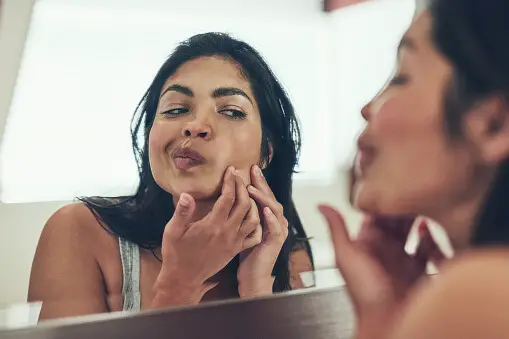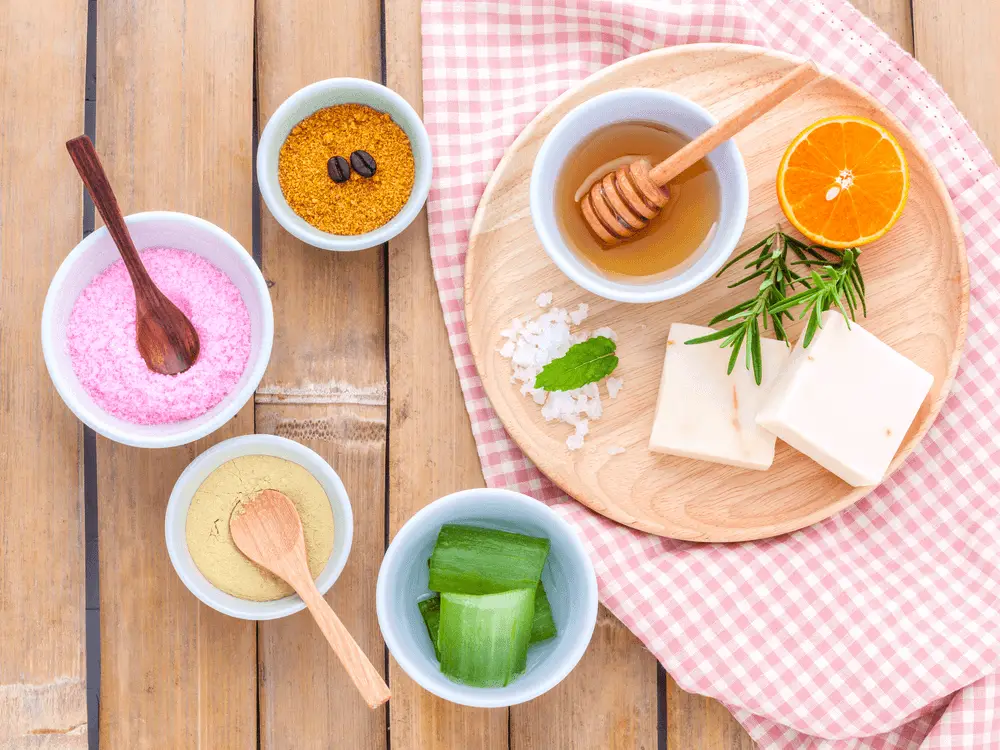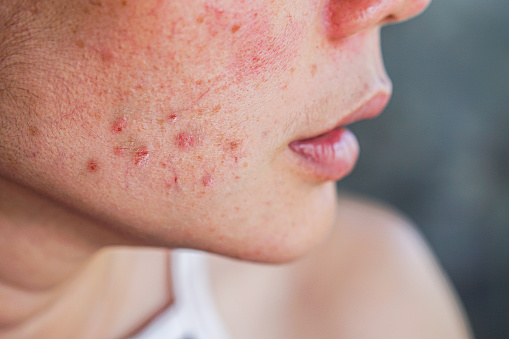Acne is one of the most common skin disorders, affecting over 85% of young adults. We have recommended home remedies to tackle this disorder and give clear skin, read on to see them.

source: Unsplash.com
Acne is a severe, inflammatory skin condition that creates pimples and patches on the face, shoulders, back, neck, chest, and upper arms, among other places.
Traditional acne treatments, such as salicylic acid, niacinamide, or benzoyl peroxide, are the most effective acne treatments. But they can be expensive and have undesired side effects like dryness, redness, and irritation. Many people seek out natural acne cures at home in the hope of avoiding these discomforts.
Many traditional cures lack scientific backing, necessitating additional investigation into their efficacy. However, if you are seeking an alternate treatment, check out the home remedies below.
Read also: Health hack: Easy ways to eliminate pimples
Causes of acne?
Acne manifests itself as whiteheads, blackheads, pimples, cysts, and nodules. It is the most common skin disorder in the United States, with up to 50 million people affected each year. It is most frequent during puberty when the sebaceous glands become active, but it can happen at any age.
While it is not harmful, it might leave scars on the skin.
Male hormones released by the adrenal glands in both males and females stimulate the glands, which create oil.
Between the ages of 12 and 24, at least 85% of persons in the United States suffer from acne.
Many factors may contribute to its development of acne, including:
- genetics
- diet
- worry and stress
- hormone changes
- infections
- oil-based cosmetics
- hot and humid climates
Treatment is determined by how severe and chronic the condition is.
7 home remedies for an acne-free clear skin

source: padhamhealthnews.org
1. Moisturize with Aloe Vera
Aloe Vera is a tropical plant that produces transparent gel from its leaves.
Lotions, creams, ointments, and soaps frequently contain the gel. Dermatologists treat abrasions, rashes, burns, and other skin disorders with it. When applied to the skin, Aloe Vera gel can heal wounds, cure burns, and reduce inflammation.
Aloe Vera includes salicylic acid and sulfur, both of which are commonly used to treat acne.
Salicylic acid, when applied to the skin, has been shown to reduce acne.
Aloe vera gel mixed with additional ingredients like tretinoin cream or tea tree oil has been shown in several tests to help with acne.
While evidence suggests that Aloe Vera may have anti-acne properties, more research is needed.
What to do
- With a spoon, scrape the gel from the aloe plant.
- Apply the gel directly to clean skin as a moisturizer.
- Repeat 1–2 times per day, or as desired.
You can also purchase Aloe Vera gel from a store, but make sure it is 100% pure Aloe with no extra components.
2. Exfoliate on a regular basis
Exfoliation is the process of removing dead skin cells from the top layer of the skin.
Chemical exfoliation is one option, but you can also exfoliate mechanically with a brush or scrub, to physically remove the cells. By eliminating the skin cells that clog pores, exfoliation may help acne. It may also improve the effectiveness of acne treatments for the skin by allowing them to penetrate deeper once the top layer of skin has been removed.
Exfoliation and its ability to treat acne are still understudied. Microdermabrasion, a type of exfoliation, has been shown in trials to enhance the appearance of the skin, including acne scarring.
Exfoliation products are widely accessible, but you may also make your own scrub at home with sugar or salt. Mechanical exfoliation, such as abrasive scrubs or brushes, can irritate the skin and cause damage. As a result, some dermatologists recommend using salicylic or glycolic acid-based treatments for moderate chemical exfoliation.
-
In a mixing bowl, combine equal parts sugar (or salt) and coconut oil.
-
Rinse your skin thoroughly after gently rubbing it with the mixture.
-
Exfoliate as often as desired, up to once a day.
3. Wear a Cucumber face mask
-
Blend one small cucumber and one cup of oatmeal to make a paste.
-
Apply 1 teaspoon of this paste to your face along with 1 teaspoon of yogurt.
-
Leave it on for 30 minutes before rinsing.
4. Make a mask with honey and cinnamon.
Honey and cinnamon contain antibacterial and anti-inflammatory properties, which are two elements that cause acne, according to a 2017 study. Honey has been shown in other studies to be able to stop the growth of acne or even kill it. This conclusion, however, does not necessarily imply that honey is a good acne treatment.
Disclaimer: If you are allergic to honey or cinnamon, you should not use this home treatment. You can have trouble swallowing or breathing if you are allergic to honey. If you have a cinnamon allergy, you may experience redness or discomfort.
Although most individuals have no trouble using a honey and cinnamon mask, some people are allergic to one or both ingredients.
If you are allergic to celery, pollen, or other bee-related items, honey applied to the skin could cause an allergic response.
- swallowing problems inflammation
- itching
- shortness of breath
- skin swelling
- wheezing or other breathing difficulties
-
To make a paste, combine 2 tablespoons honey and 1 teaspoon cinnamon.
-
Apply the mask to your face after cleaning it and keep it on for 10–15 minutes.
-
Remove the mask completely with water and massage your skin dry.
Also, try this:
- 3 tablespoon of Manuka honey and 1 tablespoon of true cinnamon
- Combine the two ingredients in a mixing bowl and microwave for 30 seconds. Check that it is not too hot.
- Apply the mixture to your face.
- Allow it to sit for 10 minutes.
- Rinse your face and pat it dry with a clean towel.
5. Avoid stressing yourself
-
get more sleep
-
engage in physical activity
-
practice yoga
-
meditate
-
take deep breaths
6. Make an Oatmeal and honey mask
Oatmeal contains avenanthramides, antioxidant and anti-inflammatory compounds that soothe itchy, dry and irritated skin. Oatmeal is also great for acne-prone skin because it absorbs oil from the skin’s surface. All of which makes oatmeal a perfect ingredient for facial masks.
This oatmeal and honey mask both pampers and fights acne. Oats, honey, lemon, and tea tree oil are used to make it.
Facts:
Oats contain anti-inflammatory properties as well as saponins, which act as a cleansing agent, making them ideal for all skin types, including sensitive skin.
Honey is also great for achieving that ‘glow’ while fighting acne and nourishing ageing skin due to its antibacterial and antioxidant properties. Honey is also known for its ability to naturally open pores.
Lemon has antibacterial and antifungal properties that help fight acne and blackheads.
The citric acid in lemon juice can help fade dark spots and acne scars. Lemon juice can also aid in the reduction of excess oil.
Lastly, due to its antiseptic properties, tea tree essential oil has been used to treat everything from acne to dandruff.
Ingredients
- 2 tablespoon old fashioned rolled oats see note on how to grind oats
- 1/2 tablespoon of lemon juice
- 2 tablespoon honey
- 4 drops tea tree essential oil
Instructions
-
-
Grind the oats.
-
In a small bowl mix together ground oats, lemon juice, honey, and tea tree oil.
-
Apply to face to create a mask.
-
Leave on the skin for 10-15 minutes. Remove the mask with cold water and a washcloth.
-
Note: To grind oats, place desired amount of oats in a spice grinder, blender, or food processor. Pulse oats until coarse and flour-like.
This recipe makes enough for two to three treatments. Store extra in the fridge in an airtight container.
7. Exercise regularly
There is very little research on the effects of exercise on acne.
Nonetheless, exercise affects bodily functions in ways that may aid in the treatment of acne.
Exercising, for example, promotes healthy blood circulation.
The increased blood flow nourishes skin cells, which may aid in the prevention and healing of acne.
Exercise also has an impact on hormone levels and regulation.
Several studies have found that exercise can reduce stress and anxiety, both of which can contribute to the development of acne.
We recommend that you get 150 minutes of aerobic exercise per week and two days of strength training per week. This can include walking, hiking, running, and weight lifting.
Conclusion
Acne is a common skin condition with a variety of underlying causes. Traditional treatments like, salicylic acid, niacinamide, or benzoyl peroxide, are still the most effective, according to experts, though some people may find them irritating.
Many people prefer to use natural remedies. Meanwhile, the majority of these mentioned home remedies for acne have not been proven to be clinically effective, but they are available as an alternative treatment option. However, if you have severe acne, you should see a dermatologist.
You can also read this article, Try these 7 natural remedies to brighten your skin.


